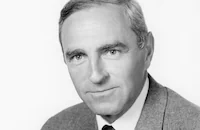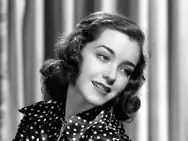The Happy Time

Brief Synopsis
Cast & Crew
Richard Fleischer
Charles Boyer
Louis Jourdan
Marsha Hunt
Kurt Kaszner
Linda Christian
Film Details
Technical Specs

Synopsis
In the early 1920s in French Canada, the Bonnard family prepares to celebrate the birthday of the family's youngest son Robert, known as Bibi. Aging dandy Grandpere Bonnard meets Bibi walking home and presents him with a canary. Bibi's neighbor, American Peggy O'Hare, who is infatuated with Bibi, then gives him a baseball catcher's mask, to the annoyance of classmate Jimmy Bishop. At the Bonnard dinner table, Bibi's mother Susan frets about the present from Bibi's uncle Desmonde, a traveling salesman--a photograph of Desmonde with two striking showgirls. Bibi's father Jacques, however, dismisses Susan's concerns. Uncle Louis, who lives across the street, is unable to visit because his dressmaker wife Felice nags him to stop drinking wine out of a water bottle and pay more attention to their single daughter Yvonne. After dinner, Jacques takes Bibi with him to his job as violinist and conductor for a small local theater that runs vaudeville acts and silent films. Bibi is mesmerized by the magician The Great Gaspari and his pretty assistant, Mignonette Chappuis. When Gaspari gets too familiar with Mignonette on stage, she exposes his most famous trick and storms offstage. Jacques and Bibi bring Mignonette home, where Jacques convinces Susan to employ her as their maid. That night, Desmonde makes an unexpected visit, to Bibi's delight. Desmonde is equally pleased to meet Mignonette, with whom he begins an immediate flirtation. The next day at school, Bibi gets into a squabble with Jimmy, who snatches the mildly provocative magazine that Bibi has gotten from Desmonde. Bibi is sent to the stern school principal, Mr. Frye, who scolds him for carrying a dirty magazine. After school, Bibi meets Mignonette to catch a matinee of The Sheik and is deeply impressed with the film and its effect on Mignonette. Upon arriving home, Bibi, Jacques and Mignonette discover Grandpere collapsed against the fence. Dr. Marchaud is summoned and warns Grandpere that if he does not stop carousing, he is doomed. Grandpere rejects the doctor's diagnosis and wishes Desmonde luck on his date with Mignonette. That evening Desmonde takes Mignonette dancing, but when he continues to flirt, she asserts that their backgrounds are too disperate for them to be happy together. Desmonde then shows her a photograph of a house he says Grandpere plans to give him and confesses he is lonely and longing to settle down. Returning home, Desmonde becomes frustrated when Mignonette refuses to kiss him goodnight. Meanwhile, downstairs, Bibi marvels with Louis about the power of Rudolph Valentino's onscreen kisses, and Louis confides that a kiss can indeed be magic. Later that night, Bibi creeps into Mignonette's room and kisses her fleetingly before returning hastily to his room. Mignonette awakens startled and, believing Desmonde is the kissing culprit, goes into his room and dumps a pitcher of water on him. At school the next day, Peggy makes a curt comment about Mignonette, which angers Bibi, while Jimmy plants a crude drawing on Bibi's desk. When the sketch is discovered, Mr. Frye is summoned. He asks Peggy if she witnessed Bibi make the drawing, and Peggy, hurt over Bibi's earlier rebuff, says she did. Mr. Frye takes Bibi into his office and strikes his open hand with a leather strap when he refuses to admit he drew the picture. Mr. Frye says he will strap Bibi daily until he confesses. That evening Louis entertains a possible suitor for Yvonne, powerful banker Alfred Grattin, but is appalled when Felice informs him that Alfred does not drink. Alfred arrives and unknowingly begins drinking the wine from Louis' water bottle. When Louis discovers Alfred is only a clerk, he throws the now-drunken young man out. A few days later, when Mignonette mentions Desmonde's promised house, Susan and Jacques accidentally reveal that the house is a fabrication. Mignonette slaps Desmonde and storms to her room. Bibi then breaks down and reveals the situation at school with Mr. Frye. Jacques, Desmonde and Louis call on Mr. Frye, who insists he is justified in punishing Bibi, until Desmonde suddenly recalls having seen Mr. Frye at a casino in Montreal and promises to spread this information through town. The Bonnards return home and toast Bibi, until Susan informs them Mignonette has departed. Susan says she agreed to let her go when Mignonette mentioned the stolen kiss. Desmonde is outraged at the insinuation until Bibi sheepishly admits he was the culprit. Desmonde rushes out to find Mignonette and, inspired, Louis goes out to make amends with Alfred. Desmonde returns with Mignonette as Grandpere is on his way out for another evening. Bibi then makes his first appearance in long pants, and Peggy, who has sneaked in, is agog with admiration. Bibi is still angry about Peggy's lie at school and she apologizes. When Bibi realizes Peggy is no longer wearing braces, he kisses her, and Susan and Jacques realize another Bonnard male is making his way into the world.

Director

Richard Fleischer
Cast

Charles Boyer

Louis Jourdan

Marsha Hunt
Kurt Kaszner

Linda Christian

Marcel Dalio
Jeanette Nolan
Jack Raine
Richard Erdman
Marlene Cameron

Bobby Driscoll
Gene Collins
Ann Faber
Kathryn Sheldon
Maurice Marsac
Edward Clark
Eugene Borden
Paul Baxley
Frank Arnold
Rose Plumer
Charles Sullivan
Abe Dinovitch
Ralph Smiley
Audrey Lou Dewey
Walter Fietila
Bruce Cameron
Crew
Carl Anderson
Clem Beauchamp
Clay Campbell
James Crowe
Milton Feldman
Earl Felton
Earl Felton
Harry Gerstad
Helen Hunt
Stanley Kramer
Charles Lawton Jr.
Jean Louis
William A. Lyon
Russell Malmgren
Rudolph Sternad
Dimitri Tiomkin
Dimitri Tiomkin
Ned Washington

Film Details
Technical Specs

Articles
The Happy Time
Taylor's play was based on stories by French-Canadian writer Robert Fontaine and bore a certain thematic and stylistic resemblance to Eugene O'Neill's only comedy, the coming-of-age tale Ah, Wilderness!. The film version of The Happy Time features Louis Jourdan as a free-living, globe-trotting salesman who returns to his small hometown in Quebec in the 1920s to visit his eccentric family. His travel tales have a profound effect on his impressionable young nephew Bibi, inspiring the boy to live life to the fullest, much to the chagrin of the boy's stern father and cantankerous grandfather.
The latter two roles are played by two other French actors, Charles Boyer and Marcel Dalio. Kurt Kasznar and Marlene Cameron were the only members of the Broadway cast to make it into the screen version. Bibi is played by Bobby Driscoll, who off-screen was as troubled as the character he plays. A popular child actor from the age of 6 with a long-term contract with Walt Disney Productions, Driscoll had received an "Outstanding Juvenile Actor" Academy Award as the beleaguered boy in the noir thriller The Window (1949). Except for one final job for Disney, voicing the title role in the animated Peter Pan (1953), The Happy Time was Driscoll's last major film appearance. As he got older, roles became harder to come by, and he fell into a tragic downward spiral of hard drugs and poverty. He was found dead of a heart attack at the age of 31 in an abandoned New York building.
The film, director Richard Fleischer, Boyer and supporting player Kasznar were all nominated for Golden Globe Awards. Earl Felton's screenplay was also nominated as Best Written American Comedy by the Writers Guild of America.
The Happy Time was turned into a Broadway musical by John Kander and Fred Ebb in 1968, winning Tony Awards for director/choreographer Gower Champion and lead actor (in the Boyer role) Robert Goulet.
Director: Richard Fleischer
Producer: Stanley Kramer
Screenplay: Earl Felton, based on stories by Robert Fontaine and a play by Samuel A. Taylor
Cinematography: Charles Lawton, Jr.
Editing: William A. Lyon
Art Direction: Carl Anderson
Original Music: Dimitri Tiomkin
Cast: Charles Boyer (Jacques Bonnard), Louis Jourdan (Uncle Desmond Bonnard), Marsha Hunt (Susan Bonnard), Bobby Driscoll (Bibi), Linda Christian (Mignonette Chappuis).
by Rob Nixon

The Happy Time
Quotes
Trivia
Notes
The introductory scenes in the film were accompanied by a voice-over spoken in French by "Grandpere," translated with English subtitles. Director Richard Fleischer was borrowed from RKO to direct The Happy Time. Louis Jourdan was borrowed from Twentieth Century-Fox and Kurt Kaszner from M-G-M for the production. Kaszner and Marlene Cameron recreated their Broadway roles for the picture.















